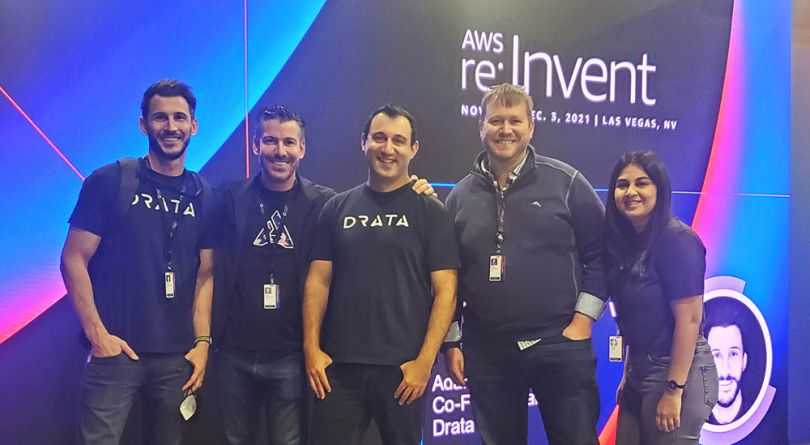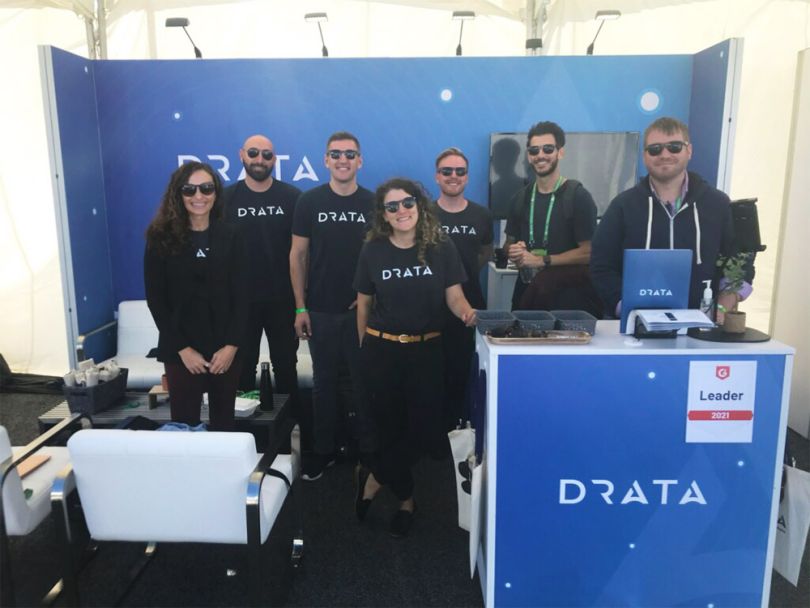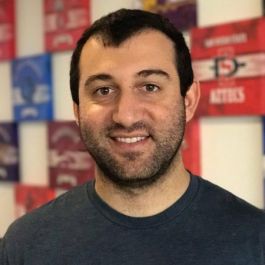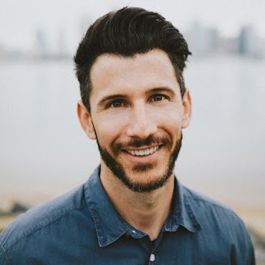Imagine: It’s July 2020. Seventeen months ago, your edtech startup was acquired. Five months ago, the world came to a screeching halt due to the Covid-19 pandemic. You’re looking at your next big life step. What do you do?
For Daniel Marashlian, Adam Markowitz and Troy Markowitz, the answer was to take a leap of faith and launch another startup.
Enter Drata, a platform that uses automation to streamline and simplify the compliance journey for companies of all sizes. Since the team launched it in 2020, the company has grown to more than 200 employees, and has already achieved unicorn status.
Before Drata
How does a young startup achieve this level of growth? Marashlian, who serves as Drata’s chief technology officer, attributes it to the backbone of trust that was built into Drata from the beginning.
“When we started Drata it was like we had a five-year-old company on day one,” Marashlian said of the comfort the long-time colleagues have with one another. “That’s a huge competitive advantage.”
This level of familiarity packs in a lot of benefits. The leadership team knows to expect the unexpected and has confidence the company can navigate the trenches.
“We know there will be tough conversations, but it’s not as scary when you have a group you already have that trust with,” said Ashley Hyman, who is Drata’s vice president of customer success.
What Does Drata Do?
If you ask Markowitz, who is Drata’s chief executive officer, trust can be defined as consistency over time, a quote he attributes to Jeff Weiner, the former CEO of LinkedIn. “That has resonated with me. This team has built trust by consistently delivering and being there for each other,” he said.
That sense of unity extends into the remote realm. Since the company launched during the Covid-19 pandemic, the team has had to forge bonds and build its workforce without any opportunities to gather in person. To bridge the gap, the HR crew has focused on putting together fun activities, such as trivia events and sending out party packs to celebrate occasions such as the Super Bowl. The company hosts in-person team meetings and gatherings as safety protocols allow.
“We want this to be a place where you want to spend a good chunk of your day,” said Marashlian.
Sound like a team you want to join? Read on for more insights into life at Drata.

Trust requires us to put faith in other people, even in challenging situations. Do you have any examples of that?
Hyman: We’re often having hard conversations — whether it’s a customer struggling due to the pandemic or other events that require escalation. Whatever the challenge, we come together to tackle issues head on. As a team, we determine how best to prioritize them while maintaining our core values. Most importantly, we take the opportunity to learn from these situations. We’re able to be vulnerable and discuss how we can improve without fear of judgment.
Markowitz: At any startup, speed is the ultimate currency. Speed only happens in high-trust environments where people feel safe and comfortable making mistakes. We need to own them and learn from them and teach others so that we don’t repeat them. It’s counterintuitive, but if a mistake is made and shared — not hidden — it’s rewarded instead of punished.
“It’s counterintuitive, but if a mistake is made and shared — not hidden — it’s rewarded instead of punished.”
How is trust central to your work at Drata?
Marashlian: We have a chief information security officer, a compliance director, security experts and security training for engineers. We didn’t launch until we had our own SOC 2 report — which we used our own product to get — which is yet another layer of trust. We did this extra work to show and validate that we do the things we say we do. That’s the product we sell. It comes down to every individual, every keystroke, to always have security in mind. We want to build trust in the product and the code.
A lot of sales teams sell ahead of the curve, but we are built on trust, so if there’s something new a customer wants, a feature or integration that’s not part of the product roadmap, the sales associate has to meet with a product director and engineering leadership has to agree to it. There is trust down the chain, which is ultimately shared with prospects and customers.
Markowitz: Trust carries more weight at our company because of what we do. Our vision is to be the trust layer between great companies and those they do business with. Walking the walk is important. It’s foundational to how we operate, and it’s our purpose for existing. It is the absolute core value. That means that, whether someone is looking or not, the same decision will be made consistently with the same values in mind. We don’t cut corners or compromise. It’s not meant to be easy. Trust is hard to earn but easy to lose.
How does trust guide the growth of the company? How do you ensure candidates align with these values?
Hyman: Ownership goes hand-in-hand with trust. During interviews, one of the most important things to figure out is whether someone understands their contribution can determine the success of the company and if they are ready and excited for that responsibility.
Markowitz: Drata is a hypergrowth startup. It takes a high-trust environment to move that fast because mistakes are going to be made. We are always thinking six months ahead, to lay the foundation for what is to come. Typically companies have years to plan, organize and execute. With how fast Drata is moving, we don’t have years to plan. It forces us to stay sharp and live up to our core values.
One of the most important things we look for in candidates is their eagerness to be a part of that. It’s not for everyone, because it’s not always comfortable. There’s no shying away from that fact. We want to make sure that’s something people crave in their day-to-day lives.

How does Drata maintain this culture while fully remote and growing so fast?
Marashlian: In May we’re getting all of our research and development team together for an off-site. We’ll go in-depth on objectives and key results, have some breakout groups and sessions on different topics, and do some team building.
I’ve been in the startup world for a long time now, and with that comes a lot of work. But establishing a remote-first work culture means that there’s flexibility in how and when that work gets done. When the foundation of the team is built on trust, there’s a level of confidence that everyone will do their part to get the job done. The trust we have for each other is what keeps this engine running.
Hyman: Someone wrote on a Glassdoor review that they needed to reduce their caffeine intake since our Slack channel more than compensated. It’s so true. When there is a new product release or a new contract is signed, there is excitement and GIFs. People get pumped up because we like to make a big deal out of things and never forget to celebrate wins.
“People get pumped up because we like to make a big deal out of things.”
Everyone is so positive and loves what they do. Adam and I say we hate the term “work-life balance” because we enjoy what we are doing. It’s a big part of our life. We bring on people who feel that way, that work is part of your life, not something separate.
For example, I have a two-year-old, so I set boundaries to spend time with my daughter in the evenings, and I give my team the flexibility to do that as well. If you want to walk your dog at 2 p.m., go for it! Block your calendar and we’ll respect your schedule; we trust our team members to achieve their objectives with flexibility and they reciprocate that same respect in return.
What does a tough day look like at Drata? How about a great day?
Markowitz: On a tough day, you might be trying to solve a problem that truly feels unsolvable. That can happen multiple times a day because what we are doing here is what most might consider impossible.
There have been a lot of great days, which is rare for a startup. On those days, we accomplish some impossible things or hire some great new people. Then when we have the next tough day, we’ve got more brainpower to help solve these problems. The rocket fuel here comes from the amazing stories we hear from our customers. We’re solving real pain for them, and they can see our culture in action when we are living up to our values. We’ll get that praise unprompted, directly from a customer. There’s nothing better than that.








